| Listing 1 - 10 of 31 | << page >> |
Sort by
|
Book
ISBN: 0835709949 Year: 1979 Volume: 8
Abstract | Keywords | Export | Availability | Bookmark
 Loading...
Loading...Choose an application
- Reference Manager
- EndNote
- RefWorks (Direct export to RefWorks)
Schoenberg, Arnold, --- Shenberg, Arnolʹd, --- Schönberg, Arnold, --- Schenberg, A. --- Shenberg, A. --- שנברג, ארנולד --- Criticism and interpretation. --- Schönberg, Arnold
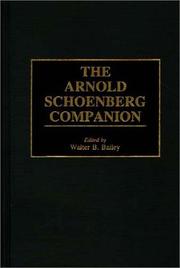
ISBN: 0313287791 Year: 1998 Publisher: Westport (Conn.): Greenwood
Abstract | Keywords | Export | Availability | Bookmark
 Loading...
Loading...Choose an application
- Reference Manager
- EndNote
- RefWorks (Direct export to RefWorks)
Schoenberg, Arnold, --- Shenberg, Arnolʹd, --- Schönberg, Arnold, --- Schenberg, A. --- Shenberg, A. --- שנברג, ארנולד --- Schoenberg, Arnold --- Schönberg, Arnold
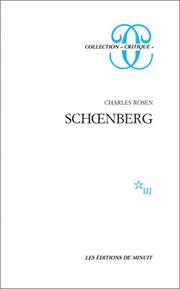
ISBN: 2707302910 9782707302915 Year: 1979 Publisher: Paris Ed. de Minuit
Abstract | Keywords | Export | Availability | Bookmark
 Loading...
Loading...Choose an application
- Reference Manager
- EndNote
- RefWorks (Direct export to RefWorks)
Schoenberg, Arnold, --- 526 --- Monografieën componisten en uitvoerders --- Schoenberg, Arnold --- Shenberg, Arnolʹd, --- Schönberg, Arnold, --- Schenberg, A. --- Shenberg, A. --- שנברג, ארנולד --- Schönberg, Arnold
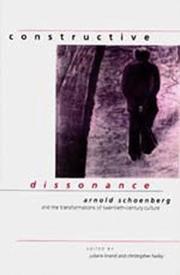
ISBN: 0520203143 058512129X Year: 1997 Publisher: Berkeley : University of California Press,
Abstract | Keywords | Export | Availability | Bookmark
 Loading...
Loading...Choose an application
- Reference Manager
- EndNote
- RefWorks (Direct export to RefWorks)
Constructive Dissonance is an interdisciplinary examination of the historical, aesthetic, and intellectual issues that formed Schoenberg's creative persona and continue to influence our response to the modernist legacy of the first half of this century. The essays of the first section investigate Schoenberg's sense of ethnic, religious, and cultural identity. The second section focuses on specific works and the interplay between creative impulse and aesthetic articulation. The final section, addresses the relationship of Schoenberg's legacy to present-day thought and practice.
Schoenberg, Arnold, --- Schoenberg, Arnold --- -Congresses --- -Schoenberg, Arnold --- Congresses --- Shenberg, Arnolʹd, --- Schönberg, Arnold, --- Schenberg, A. --- Shenberg, A. --- שנברג, ארנולד --- Congresses. --- Schönberg, Arnold
Book
ISBN: 0460031430 Year: 1976 Publisher: London Dent
Abstract | Keywords | Export | Availability | Bookmark
 Loading...
Loading...Choose an application
- Reference Manager
- EndNote
- RefWorks (Direct export to RefWorks)
Composers --- -Songwriters --- Musicians --- Biography --- Schoenberg, Arnold --- Biography. --- -Biography --- Schönberg, Arnold. --- Schoenberg, Arnold, --- Shenberg, Arnolʹd, --- Schönberg, Arnold --- Schenberg, A. --- Shenberg, A. --- שנברג, ארנולד
Book
ISBN: 9780521550352 9781139048934 9781139957397 1139957392 1139048937 0521550351 1139948911 1139949969 1139961624 1139960571 1139956329 1139958453 1139959506 1108722075 1322066299 Year: 2014 Publisher: New York
Abstract | Keywords | Export | Availability | Bookmark
 Loading...
Loading...Choose an application
- Reference Manager
- EndNote
- RefWorks (Direct export to RefWorks)
Schoenberg and Redemption presents a new way of understanding Schoenberg's step into atonality in 1908. Reconsidering his threshold and early atonal works, as well as his theoretical writings and a range of previously unexplored archival documents, Julie Brown argues that Schoenberg's revolutionary step was in part a response to Wagner's negative charges concerning the Jewish influence on German music. In 1898 and especially 1908 Schoenberg's Jewish identity came into confrontation with his commitment to Wagnerian modernism to provide an impetus to his radical innovations. While acknowledging the broader turn-of-the-century Viennese context, Brown draws special attention to continuities between Schoenberg's work and that of Viennese moral philosopher Otto Weininger, himself an ideological Wagnerian. She also considers the afterlife of the composer's ideological position when, in the late 1920s and early 1930s, the concept of redeeming German culture of its Jewish elements took a very different turn.
Redemption. --- Schoenberg, Arnold, --- Criticism and interpretation. --- Redemption --- Religion --- Shenberg, Arnolʹd, --- Schönberg, Arnold, --- Schenberg, A. --- Shenberg, A. --- שנברג, ארנולד --- Schönberg, Arnold
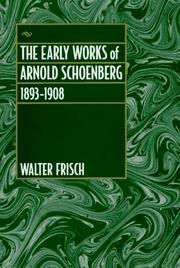
ISBN: 0520078195 0520212185 0585281378 Year: 1993 Publisher: Berkeley : University of California Press,
Abstract | Keywords | Export | Availability | Bookmark
 Loading...
Loading...Choose an application
- Reference Manager
- EndNote
- RefWorks (Direct export to RefWorks)
Schoenberg, Arnold, --- Criticism and interpretation. --- Schoenberg, Arnold --- -Schoenberg, Arnold --- Criticism and interpretation --- Shenberg, Arnolʹd, --- Schönberg, Arnold, --- Schenberg, A. --- Shenberg, A. --- שנברג, ארנולד --- Schönberg, Arnold
Book
ISBN: 9780195383577 0195383575 Year: 2018 Publisher: New York, NY Oxford University Press
Abstract | Keywords | Export | Availability | Bookmark
 Loading...
Loading...Choose an application
- Reference Manager
- EndNote
- RefWorks (Direct export to RefWorks)
Schoenberg's Correspondence with American Composers is the first edition of all known and available letters between Arnold Schoenberg and over seventy American composers written between 1915 and 1951, in English and English translation and with commentary. In six chronologically organized chapters, the correspondence first casts new light on Schoenberg's contacts with American composers before 1933, including correspondence with students and champions of his music (Israel Amter, James Francis Cooke, Henry Cowell, Edgar Varèse, and Adolph Weiss among others). The letters after 1933 show how Schoenberg gradually built a network of composer colleagues and friends, among them Mark Brunswick, Oscar Levant, Roger Sessions, Nicolas Slonimsky, Gerald Strang, with whom he discussed compositional ideas, specific musical works and writings, performances and the publication of his compositions. These letters also provide insight into his ideas about teaching in private settings, at the Malkin Conservatory and the University of California. The correspondence of his last years illuminates how the reception of Schoenberg's music in the United States was flourishing and how he attracted a growing number of disciples exploring twelve-tone composition. The book also qualifies the concept of and Schoenberg's association with the Second Viennese School. Schoenberg's Correspondence with American Composers not only illuminates a varied and vivid epistolary style, but clearly demonstrates Schoenberg's far-reaching connections in the American music world [Publisher description]
Composers --- Music --- Correspondence. --- Attitudes --- Social networks --- History and criticism --- Sources --- Schoenberg, Arnold, --- Shenberg, Arnolʹd, --- Schönberg, Arnold, --- Schenberg, A. --- Shenberg, A. --- שנברג, ארנולד --- Schönberg, Arnold
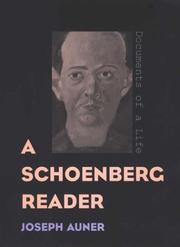
ISBN: 1281740705 9786611740702 030012712X 9780300127126 0300095406 9780300095401 9781281740700 Year: 2003 Publisher: New Haven Yale University Press
Abstract | Keywords | Export | Availability | Bookmark
 Loading...
Loading...Choose an application
- Reference Manager
- EndNote
- RefWorks (Direct export to RefWorks)
Arnold Schoenberg's close involvement with many of the principal developments of twentieth-century music, most importantly the break with tonality and the creation of twelve-tone composition, generated controversy from the time of his earliest works to the present day. This authoritative new collection of Schoenberg's essays, letters, literary writings, musical sketches, paintings, and drawings offers fresh insights into the composer's life, work, and thought. The documents, many previously unpublished or untranslated, reveal the relationships between various aspects of Schoenberg's activities in composition, music theory, criticism, painting, performance, and teaching. They also show the significance of events in his personal and family life, his evolving Jewish identity, his political concerns, and his close interactions with such figures as Gustav and Alma Mahler, Alban Berg, Wassily Kandinsky, and Thomas Mann. Extensive commentary by Joseph Auner places the documents and materials in context and traces important themes throughout Schoenberg's career from turn-of-century Vienna to Weimar Berlin to nineteen-fifties Los Angeles.
Composers --- Songwriters --- Musicians --- Schoenberg, Arnold, --- Shenberg, Arnolʹd, --- Schönberg, Arnold, --- Schenberg, A. --- Shenberg, A. --- שנברג, ארנולד --- Biography --- E-books --- Schönberg, Arnold
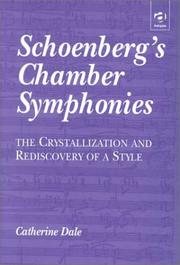
ISBN: 1859282571 Year: 2000 Publisher: Aldershot ; Burlington ; Singapore Ashgate
Abstract | Keywords | Export | Availability | Bookmark
 Loading...
Loading...Choose an application
- Reference Manager
- EndNote
- RefWorks (Direct export to RefWorks)
Schoenberg, Arnold --- -Criticism and interpretation --- -Schoenberg, Arnold --- Criticism and interpretation --- Schoenberg, Arnold, --- Shenberg, Arnolʹd, --- Schönberg, Arnold, --- Schenberg, A. --- Shenberg, A. --- שנברג, ארנולד --- Criticism and interpretation. --- Schönberg, Arnold --- Schönberg, Arnold
| Listing 1 - 10 of 31 | << page >> |
Sort by
|

 Search
Search Feedback
Feedback About UniCat
About UniCat  Help
Help News
News